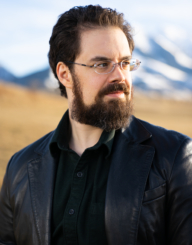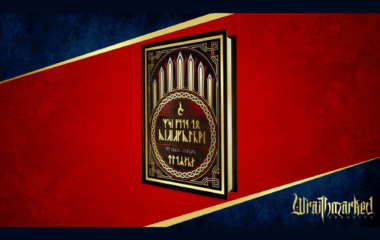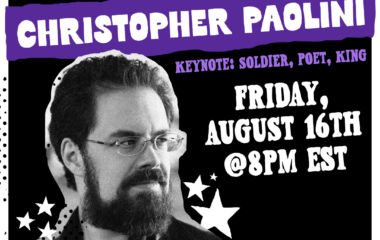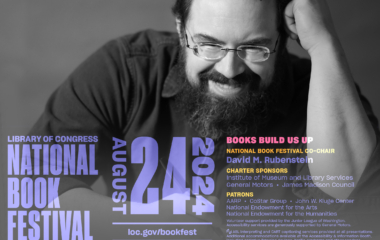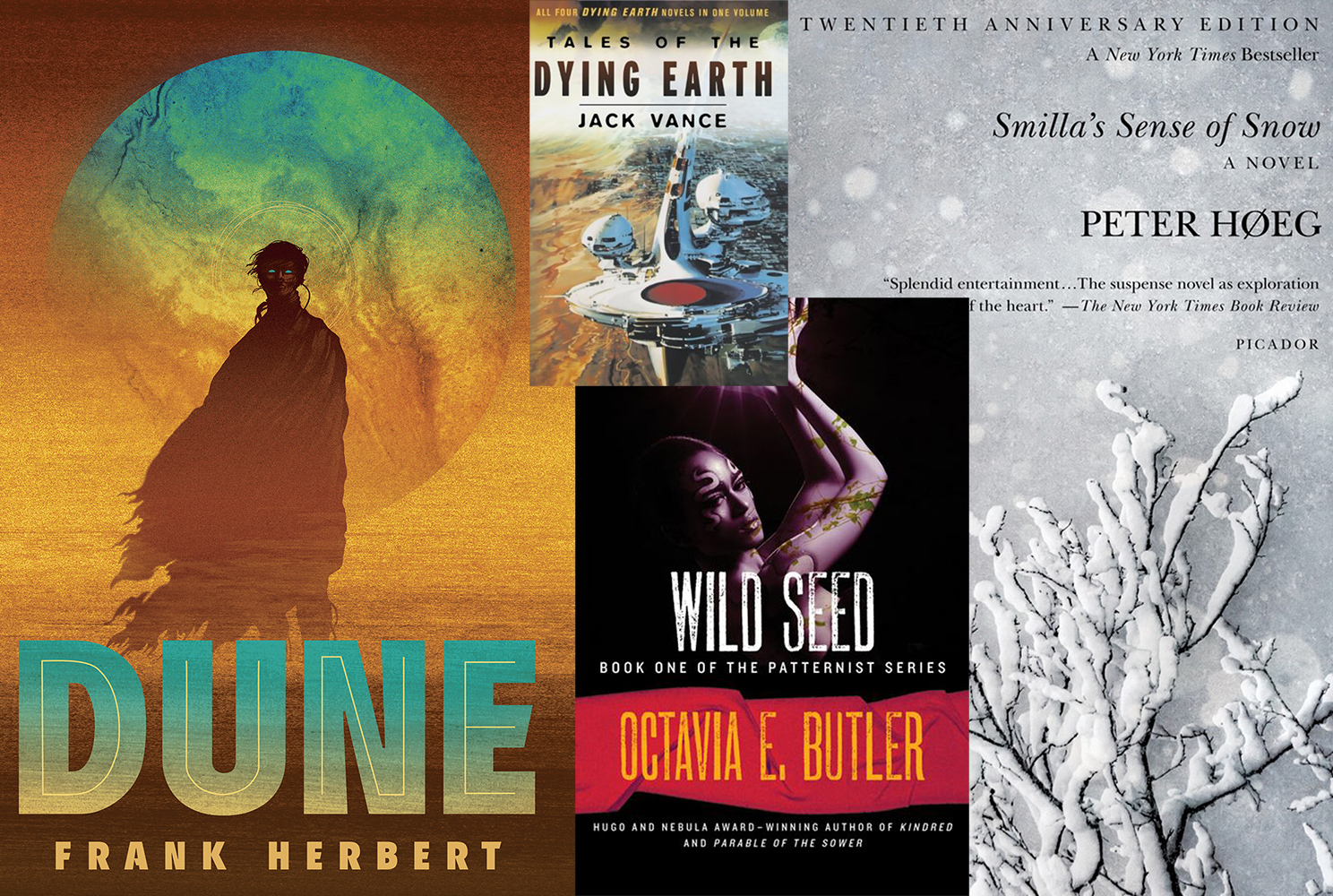
As with any top ten or favorites list, it’s inevitable that many deserving entrants will be passed over. Below, you may notice the absence of Ray Bradbury, Gene Wolfe, Ursula K. Le Guin, Philip K. Dick, C. J. Cherry, or any number of pillars of the genre. There is also a conspicuous lack of books published in recent years. This is partly due to my own reading habits, and partly because the following are some of the books that I imprinted upon at an early age and which have had an enormous influence on my thinking and writing. With that said, onward to the list of my favorite sci-fi books! You can also view all my reviews here
 Dune by Frank Herbert
Dune by Frank Herbert
My rating: 5 of 5 stars
Dune is one of the best examples of the hero’s journey in fiction. Most authors, myself included, need more than one book in order to tell an epic coming-of-age story. Herbert did it in one while also creating a unique and interesting setting. Part of his genius as an author was his ability to imply far more about his world than he actually showed. As a result, Dune feels as if it was written by an inhabitant of Herbert’s universe; no small achievement.
As with Anna Karenina, Dune goes beyond the usual surface elements that so much of fiction relies upon. It deals with questions of leadership, ecology, and philosophy (and so much more) while also telling a darn good story.
And it contains one of my favorite quotes:
“I must not fear.
Fear is the mind-killer.
Fear is the little-death that brings total obliteration.
I will face my fear.
I will permit it to pass over me and through me.
And when it has gone past I will turn the inner eye to see its path.
Where the fear has gone there will be nothing.
Only I will remain.”
The book does have some flaws (the death of Muad’Dib’s son is dealt with too quickly, and the only homosexual character is the villain), but even with them, Dune is a masterpiece.
 The Hyperion Omnibus by Dan Simmons
The Hyperion Omnibus by Dan Simmons
My rating: 4 of 5 stars
Baroque, enormously complicated, and oftentimes contradictory, the Hyperion series can be a frustrating read. But it’s filled with brilliant writing and equally brilliant concepts, and it’s one of the few far-future works that manages to pair interesting and somewhat relatable characters with the sometimes truly outlandish creations advanced technology makes possible. (Simmon’s living Dyson sphere being a particular favorite of mine.)
 Wild Seed by Octavia E. Butler
Wild Seed by Octavia E. Butler
My rating: 5 of 5 stars
As close to a perfect book as I can imagine. There’s almost nothing that one could do to improve Butler’s prose, pacing, or characterization. She never gives you an excuse to not turn the page . . . which is why I read Wild Seed in a single sitting. The moral issues Butler addresses make for fascinating drama.
 Farmer in the Sky by Robert A. Heinlein
Farmer in the Sky by Robert A. Heinlein
My rating: 3 of 5 stars
The unbridled optimism and can-do attitude of Farmer in the Sky makes me smile. Even though the main characters are fleeing an overcrowded Earth, the sense of possibility that Heinlein had about humanity’s future was a wonderful thing. Alas, the female characters aren’t handled particularly well – mainly because of their lack of presence – which is a regrettable flaw in an otherwise admirable YA(ish) story.
 Starship Troopers by Robert A. Heinlein
Starship Troopers by Robert A. Heinlein
My rating: 4 of 5 stars
Starship Troopers is the archetypal military sci-fi book. . . and yet it’s far more concerned with the politics and philosophy of its setting than so many of its successors. The action is almost an afterthought. The book also has a rather odd story structure that can take some effort to get into. But it is worth the effort, and though Heinlein often takes a different view of society than many of us do today, I still find myself wishing that more authors were willing to grapple with the questions and issues that Golden Age sci-fi authors so often threw themselves at.
 Moon of Three Rings by Andre Norton
Moon of Three Rings by Andre Norton
My rating: 4 of 5 stars
Like Dune, this book may be more fantasy than science fiction, but it has a wonderful, somewhat eerie feeling. If humanity spreads among the stars and establishes itself on countless different planets, what strange things might a spacer find in the out-of-the-way corners? Do yourself a favor and don’t read any spoilers for the book. It’s best tackled without expectations. There are sequels if you want, and I remember reading and enjoying the second one.
 The Persistence of Vision by John Varley
The Persistence of Vision by John Varley
My rating: 5 of 5 stars
Varley has written a number of excellent books – The Golden Globe being one of my favorites – but I’d recommend starting with this short story collection. Each story is beautifully written, and the titular entry won both the Hugo and the Nebula. Deservedly so, in my opinion. As a writer, Varley manages to capture the weirdness of humanity without losing the ability to write believable characters. He also does a great job of evoking a sense of wonder about the possibilities of our future . . . You know, after writing that, I think I have to go read his work again!
 Smilla’s Sense of Snow by Peter Høeg
Smilla’s Sense of Snow by Peter Høeg
My rating: 5 of 5 stars
Not science fiction as the genre is commonly understood, but it still fits firmly within the overarching category. The greatest strength of the book is Smilla’s character. Høeg perfectly captures what it feels like to be an outsider: something that so many attempt and fail. I would go further and argue that Smilla did everything that The Girl with the Dragon Tattoo was trying to do . . . only better and about thirteen years earlier. What’s more, the film adaptation of Smilla really matches the feel of the book. A rare thing in Hollywood. If you haven’t already read the book, I’d recommend watching the film first and then tackling the novel.
 Rendezvous with Rama by Arthur C. Clarke
Rendezvous with Rama by Arthur C. Clarke
My rating: 4 of 5 stars
Classic hard sci-fi. Short, full of interesting ideas, and with one of the best ending lines in the genre. (Seriously, Hollywood, why haven’t you adapted this yet?) In many ways, a more human and interesting take on the first contact idea Clark explored in 2001.
 Tales of the Dying Earth by Jack Vance
Tales of the Dying Earth by Jack Vance
My rating: 4 of 5 stars
I debated putting the Book of the New Sun series by Wolfe here, but Vance has the advantage of brevity. In fact, that might be the key to his success. He was, in a single paragraph, able to sketch the most incredible cultures and societies. With a throwaway line, he’d outline a world as interesting as all of Dune. And he did it again and again and again. His approach didn’t lend itself to constructing large, self-sustaining epics, but that’s okay. The gleaming spots of brilliance dotted throughout his stories are pleasure enough.
I hope you’ve enjoyed the list of my favorite sci-fi books. You can check out my other recommendations by clicking here. favorite sci-fi books favorite sci-fi books

